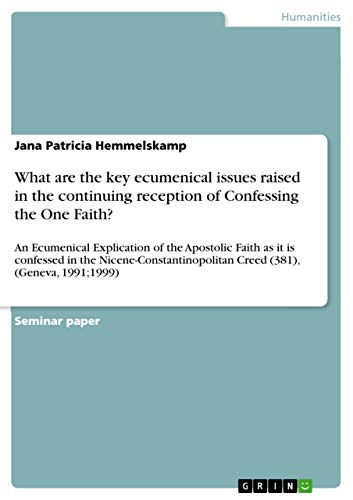Verwandte Artikel zu What are the key ecumenical issues raised in the continuing...
What are the key ecumenical issues raised in the continuing reception of Confessing the One Faith?: An Ecumenical Explication of the Apostolic Faith ... Creed (381), (Geneva, 1991;1999) - Softcover

Zu dieser ISBN ist aktuell kein Angebot verfügbar.
Alle Exemplare der Ausgabe mit dieser ISBN anzeigen:„Über diesen Titel“ kann sich auf eine andere Ausgabe dieses Titels beziehen.
- VerlagGRIN Verlag
- Erscheinungsdatum2014
- ISBN 10 3656718687
- ISBN 13 9783656718680
- EinbandTapa blanda
- Auflage1
- Anzahl der Seiten18
Neu kaufen
Mehr zu diesem Angebot erfahren
Versand:
EUR 32,99
Von Deutschland nach USA
Beste Suchergebnisse beim ZVAB
What are the key ecumenical issues raised in the continuing reception of Confessing the One Faith? : An Ecumenical Explication of the Apostolic Faith as it is confessed in the Nicene-Constantinopolitan Creed (381), (Geneva, 1991;1999)
Buchbeschreibung Taschenbuch. Zustand: Neu. Druck auf Anfrage Neuware - Printed after ordering - Seminar paper from the year 2013 in the subject Theology - Systematic Theology, grade: 1,7, Trinity College Dublin (Irish School of Ecumenics), course: Authority, Tradition, Experience: Ecumenics as Intercultural Theology, language: English, abstract: The Nicene Creed begins with the confident affirmation 'We believe in' (pisteuomen eis) referring to Father, Son and Holy Spirit and the one, holy, cath-olic and apostolic Church.' This introduction is taken from the World Council of Churches' 'Confessing the One Faith', a Faith and Order Study Document dealing with the key ecumenical issues determined in the First Council of Nicaea in 325 and in the Second Council of Constantinople in 381. This introductory sentence already indicates the main topics and key ecumenical issues thematized in the history of Christian dogma from the beginning of the Christian faith until nowadays, namely the unity of the Church and the Christian Triune God.One year after the achievement of his autocratic rule, Constantine convoked the First Ecumenical Council in 325 to restore the unity of the church as the most significant factor of integration in his empire. This council does not only mirror the essential change within the balance of power and relationship of church and state at that point of time, but it also marks the ecumenically relevant emphasis of the oneness of the church. In this council it was decided that there is only one church which can be characterized as holy, catholic and apostolic. Fifty-six years later, this church historical success was pursued in the Second Ecumenical Council in Constantinople in terms of the doctrine of the Trinity. Hereby, the relationship between God and Jesus Christ was indeterminate and the divinity of Jesus Christ and the Holy Spirit was questioned. As the first dogma in ecclesiastical history, it was agreed that the Christian God is triune and consists of God Father, God Son and the Holy Spirit.In the following essay, these two key ecumenical issues reinforced in the first two Ecumenical Councils in the fourth century regarding the unity of the Church and the Trinitarian theology of Christianity shall be examined and further explained with the help of the World Council of Churches' 'Confessing the One Faith'. Hereby, the key ecumenical agreements will be pointed out as well as their relevance and consequences for inter-religious coexistence and dialogue nowadays. Artikel-Nr. 9783656718680
Weitere Informationen zu diesem Verkäufer | Verkäufer kontaktieren

